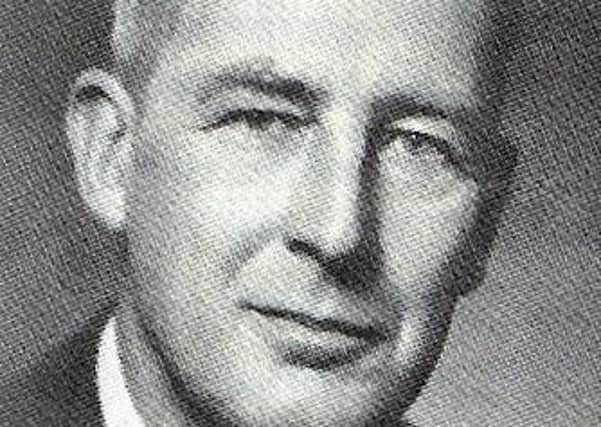Obituary: Ian Isles, MC FFA, actuary


Ian Isles was general manager of the Scottish Equitable Life Assurance Society for more than 15 years from 1962 until his retirement in 1977. Ian, on leaving Dundee High School in 1934, joined Scottish Equitable, with a view to taking the actuarial examinations. At that time, most actuarial students enrolled straight from school and the actuarial profession was sometimes referred to as the “poor man’s profession”, as entrants to accountancy and legal professions had to pay to become “articled” whereas life offices were delighted to employ potential actuaries.
The outbreak of the Second World War interrupted Ian’s studies and he signed up. He went to Sandhurst, where he was commissioned and joined the 1st Derbyshire Yeomanry. They were sent to Tunis in 1942 as a reconnaissance regiment of the 6th Armoured Division and were the only unit to have continuous service throughout the Tunisian campaign.
Advertisement
Hide AdAdvertisement
Hide AdBy 20 April, 1943, the Allies were within 40 miles of Tunis, when the Germans made a counter attack on a narrow front which disrupted the Allies’ plans.
On 25 April, 1943, Ian led a reconnaissance party towards Pont du Fahs. Despite coming under continuous shell-fire, they continued to their objective and, before returning to their own lines, obtained valuable information about the German defensive positions, which enabled the Allies to continue their advance to Tunis.
For his part in that exercise, Ian was awarded an MC.
The Tunisian campaign finished on 13 May, 1943 and on 26 May, Ian received his MC from General Anderson, commander of the British 1st Army. After the Germans had surrendered in North Africa, the 1st Derbyshire moved to Italy, where they were involved in the capture of Monte Cassino in May 1944.
In 1946 Ian returned to Scottish Equitable and in 1947 became a Fellow of the Faculty of Actuaries.
Having qualified as an actuary, Ian held several posts before being appointed assistant general manager in 1960, becoming general manager on the retirement of his predecessor in 1962.
Ian was Scottish Equitable’s first general manager to have spent all his business career with the office. His colleagues, who he had grown up with, were friends but they were now his subordinates; to his credit they remained his friends. The growth in the society’s business and expansion into new fields meant that Ian had to delegate but remain accountable to the board.
During his term of office there were numerous changes. The office entered the unit-linked market. Scottish Equitable and its co-owners, Scottish Amicable, sold their interest in the Scottish Insurance Corporation to the Yorkshire Insurance Company.
Jointly with Scottish Life and Scottish Provident, Scottish Equitable established St Andrew Computer Co to provide computer services to the three offices. Funds under management grew more than tenfold. Ian served his professional body in various roles; he was on the Board of Examiners (1958-60), hon librarian (1961-5), hon treasurer (1974-6) and vice-president (1977-81).
Advertisement
Hide AdAdvertisement
Hide AdHe was chairman of the Associated Scottish Life Offices in 1968-9. Not surprisingly, Ian was a strong believer in the important role played by life assurance in providing protection and security for members of the public.
He was particularly concerned at the losses incurred by policyholders as a result of insurance company failures in the 1970s and played an important role in the creation of the Policyholders’ Protection Fund, designed to provide protection for the public in the event of future failures and funded by a levy on all UK life assurance funds.
Such protection is now provided by the Financial Services Compensation Scheme.
In 1975 Ian was one of three representatives drawn from the insurance company sector to be appointed a director of the Policyholders’ Protection Fund by the government.
Ian was a keen sportsman. He took pride in the fact that he had represented his office at soccer, cricket, skittles, golf, bridge and badminton. He enjoyed rugby both as a player and a supporter.
He had played rugby while at school and on leaving school joined Edinburgh Borderers Rugby Football Club.
When he stopped playing, he continued his membership of that club and in due course was elected a honorary vice-president. For many years he was a familiar figure as a steward in the West Stand at Murrayfield. He was a member of Mortonhall Golf Club, where he had two terms as captain, namely 1963-65 and 1979-80, and Luffness Golf Club, where, until relatively recently, he was one of a group of actuaries who played regularly once a month.
Ian enjoyed the social life associated with his various activities. He encouraged others to participate in social activities – his motto could have been “work hard and enjoy life”.
Advertisement
Hide AdAdvertisement
Hide AdHe was a member of the Scottish Actuaries Club and its chairman in 1976/7. He attended its dinners regularly until he moved into Cluny Lodge. He was an enthusiast about the International Actuarial Congresses and passed that enthusiasm onto younger colleagues.
Ian will be remembered as an inspirational leader but a modest man, extremely loyal to all that he undertook and as chief executive, a person interested in the wellbeing of junior colleagues.
Ian married Betty Boyd, who was herself an actuarial student, in 1947. They had three children, Donald, Morna and Keith, who between them had four children, one of whom, Douglas, qualified as an FFA in 1999.
At the time of his death Ian had five great-grandchildren.